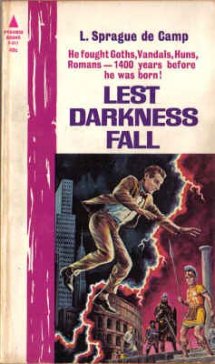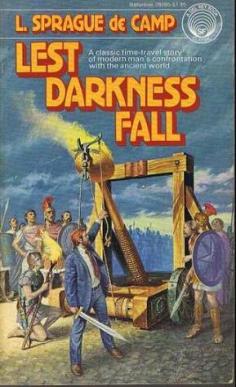It’s been almost a whole year since I read my first de Camp book, The Tritonian Ring. HP of Every Day Should Be Tuesday fame and I did our para-read of the title and both enjoyed it to varying degrees.
So how about Lest Darkness Fall, a title specifically mentioned in the illustrious (or notorious) Appendix N? This one fell into my lap not too long ago in my secondhand bookstore adventures, but I must admit The Appendix N Book Club’s recent coverage is what really spurred me to give it a read.

Long-story-short, I enjoyed it. Whereas I gave The Tritonian Ring a 3/5, I think I’d throw Lest Darkness Fall an extra point or half, putting it somewhere in the 3.5-4/5 range. Pretty solid.
Interestingly, there’s not a whole lot of scifi or fantasy going on in this one. The premise of the story is lifted none-too-subtly from Mark Twain’s Connecticut Yankee in King Arthur’s Court, and the hook is nothing grander than a bolt of lightning. Is it magic? Is it some kind of science (‘a la Frankenstein)? Who knows? Ultimately it’s irrelevant.
*Minor spoilers*
The retelling of a modern man thrust back in time, equipped only with his wits and a superior mental store of knowledge makes for a fun tale. There’s no (real) sorcery, no aliens or lost civilizations; not even any fellow time-travelers. But our American protagonist, Martin Padaway, must build a new life and achieve the lofty goal he sets for himself.
Reading about the economic and political dealings of a literal man out of time may not do it for everyone. There are some fight scenes and Padaway unwittingly finds himself in military command, but most of his victories come in the form of social manipulations and maneuverings. If you’re all about ACTION, this is another one you may want to give a skip.
*Medium-Spicy Hot Spoilers*
I have to say the story started down points with me because of the whole flawed premise. No, not random time travel that happens right after it’s posited by a random dude. That’s fine. It’s the idea that this archaeologist thought he had to save the world from the so-called “Dark Ages.” The idea that the time period after the fall of the Roman Empire was a historic black hole devoid of scientific and cultural progress may be a popular misconception that completely ignores the accomplishments of the Byzantine Empire and other parts of Western Europe, but…
De Camp was a history guy and he should have known better. And maybe he did, but he apparently considered Classical Rome some sort of apex. Still, it sticks in my craw to get this from the guy who reputedly criticized Howard’s works for not being historically realistic enough.
His disregard for religion in general was also pretty clear. The fights between various ancillary characters regarding different forms of Christianity (orthodox versus a number of different heretical branches) were sometimes entertaining, but more often I found myself put off by their silliness. Padaway himself didn’t really seem to see religion as anything more than a kind of tribal classification. “I’m a Congregationalist. It’s the closest thing we have to (insert religion) in America” became a gag line to be supplied whenever anyone asks him about his creed.
Perhaps this is why I didn’t find Padaway to be that compelling of a character. He’s got his principles, sure – he tries not solve his problems non-violently where possible, and he doesn’t pursue revenge when the opportunity is open to him. But he is a “modern man” in the sense that he doesn’t seem to give much thought to ideals or powers greater than himself (aside from the overarching goal of “avoiding the fall of Rome to the darkness!!”
Contrary to the Appendix N Bookclub guys, who sometimes take the time to identify “problematic” elements in these stories (to be fair Hoi seems to be more circumspect in this), I wasn’t offended by the end of the story, in which Padaway (a) realized he was a big-shot now and didn’t need to put up with women he wasn’t not completely enamored with (b) sent Justinian a letter advising him that he may want to nip Islam in the bud before it’s born (c) merely started taxing slavery rather than trying to immediately end the practice.
Padaway did eventually become a little full of himself, but I saw his behavior as somewhat of an adaptation to his new environment. It’s well and good to judge by today’s standards, but when you’re living in a rough-and-tumble world where might makes right and you want to survive, you build and display power.
As to the criticism that he was a little too good and knowledgeable, I agreed. It didn’t ruin the story for me, as he did encounter failures. He couldn’t produce a working clock. He couldn’t get gunpowder to work. It took a lot of trial and error to produce usable paper. Still, I did find myself thinking “who the hell is this guy?” Archaeologist who knows how to build a printing press, a stink bomb, a superior horse collar, a crossbow (ok that one I can maybe buy), brandy distillation, etc?

And he seemed to know certain historical occurrences almost to the day. “This deposed king should be returning to Rivella tomorrow.” Come on.
But those points aside, there was a lot to enjoy. His Arian friend the banker was a fun, if silly, character. I was pleased to see Belisarius make an appearance (though Justinian’s order prompting him to join Padaway was ridiculous). The story itself wasn’t overly long and moved at a decent pace. Though it was light on action, it had plenty of conflict. If you’re a fan of the kinds of stories in which a protagonist must think and bluff his way out of most sticky situations (I almost want to invoke Asimov, but his style is more serious than de Camp’s), you may enjoy Lest Darkness Fall.
In the context of Appendix N, I must admit this one more than any of the other entries I’ve read had me scratching my head. My first thought was “NPCs and hirelings (or whatever they’re called)” because this story’s got tons of them. Appendix N Bookclub talked about economics and world building, which I think is a great takeaway. When Jeffro did his retrospective on this story, he talked about domain-level play and provided quite an extensive write-up of in-game applications of some of its elements.
Bottom line: this wasn’t one of my favorite Appendix N reads, but I’m glad I picked it up. Enjoyable without being a masterpiece. But when you’re talking about part of body of work that’s of a high baseline quality, not being the best isn’t shameful.
-Bushi

Dude, who CAN’T make a printing press? What did they teach YOU in school anyway? ;-)
I’ve always wondered why these type of time traveling books ever got any traction. The majority of people can’t fix their own cars, diagnose what’s wrong with their light switches and if the toilet goes bad, they have to call a plumber. So if someone from my generation went back in time, unless they were a genius, they’d get killed by the first guy bigger than them when they opened their mouth and spewed out 21st century cant.
Not that I’m bitter about the general population here in the United States or anything.
LikeLiked by 1 person
Haha yeah…it occurred to me, too. I can’t even find my way most places without GPS anymore, which is terrible.
LikeLiked by 1 person
I’m pretty fond of this book, tho’ I agree with a lot of your criticisms. His contempt for Christianity and religion generally was genial in way but contempt nonetheless. A number of sf writers from his era were similar in this regard. It led to a certain blindness to the religious mindset.
I think the main character was basically a self insert. He basically had De Camp’s knowledge set:Latin, history of tech & some history of war, etc.
“Enjoyable but not a masterpiece” is pretty apt.
LikeLiked by 1 person
The subgenre pretty much demands a protagonist who is bizarrely omnicompetent. Unless it is Bill and Ted’s Excellent Adventure, I guess.
I think this is the de Camp story where the protag introduces double entry accounting to the Roman Empire. You had me at double entry accounting.
Anyway, I picked up a copy a few months ago but haven’t gotten around to reading it yet.
I don’t talk much about gameability in my reviews, but I’m going to when I finally get around to reviewing Andre Norton’s The Beast Master. It strikes me as having a lot you can very easily pull over, and none of the Appendix N series to my knowledge have covered it, focusing on other Norton works instead.
LikeLiked by 1 person
Looking forward to that, HP. I actually have never seen the film *or* read the book!
LikeLiked by 1 person
Both are well worth it in their own way.
LikeLike